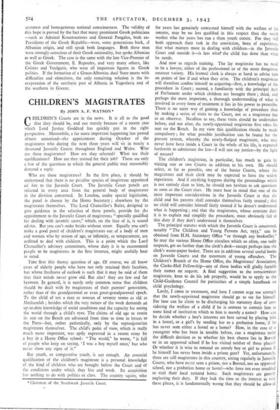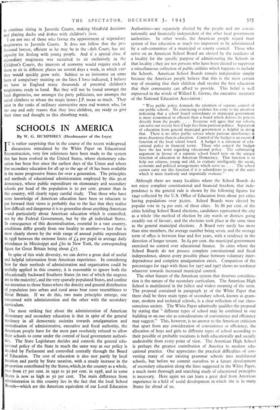CHILDREN'S MAGISTRATES
By JOHN A. F. WATSON *
CHILDREN'S Courts are in the news. It is all to the good that they should be, and not merely because of a recent case which Lord Justice Goddard has quickly put in the right perspective. Meanwhile, a far more important happening has passed almost unnoticed—the appointment during October of the magistrates who during the next three years will sit in nearly a thousand Juvenile Courts throughout England and Wales. Who are these magistrates? How are they selected? What are their qualifications? How are they trained for their job? These are only a few of the questions to which the general public may reasonably demand a reply.
Who are these magistrates? In the first place, it should be understood that there is no peculiar species of magistrate appointed ad hoc to the Juvenile Court. The Juvenile Court panels are selected in every area from the general body of magistrates in the division concerned. In London, under special legislation, the panel is chosen by the Home Secretary ; elsewhere by the magistrates themselves. The Lord Chancellor's Rules, designed to give guidance in the selection of these panels, provide for the appointment to the Juvenile Court of magistrates " specially qualified for dealing with juvenile cases," which, on the face of it, is sound advice. But you can't make bricks without straw. Equally you can't make a good panel of children's magistrates out of a body of men and women who by reason of age, or infirmity, or temperament, are unfitted to deal with children. This is a point which the Lord Chancellor's advisory committees, whose duty it is to recommend people to be magistrates in the first instance, might usefully bear in mind.
Take first this thorny question of age. Of course, we all know cases of elderly people who have not only retained their faculties, but whose freshness of outlook is such that it may be said of them that their minds never grow old. But alas! they are few and far between. In general, it is surely only common sense that children should be dealt with by magistrates of their parents' generation, rather than of the grandparental or even great-grandparental epoch. To the child of ten a man or woman of seventy seems as old as Methuselah ; besides which the very nature of the work demands an up-to-date knowledge of social conditions and the capacity for seeing the world through a child's eyes. The claims of old age to retain its seat on the Bench are advanced from time to time in letters to the Press—but, rather pathetically, only by the septuagenarian magistrates themselves. The child's point of view, which is really much more important, was aptly expressed in a recent essay by a boy in a Home Office school: " The world," he wrote, " is full of people who keep on saying, ' I was a boy myself once,' but who never show any signs of it."
But youth, or comparative youth, is not enough. An essential qualification of the children's magistrate is a personal knowledge of the kind of children who are brought before the Court and of the conditions under which they live and work. Its acquisition has nothing to do with politics or class. The country squire, who
* Chairman of the .Southwark Juvenile Court, for years has genuinely concerned himself with the welfare of his tenants, may be no less qualified in this respect than the social
worker who for years has run a slum youth centre. For they will both approach their task in the conviction, born of experience, that what matters most in dealing with children—in the Juvenile Court and outside it—is less what the child has done than what he needs.
And now as regards training. The lay magistrate has no need to be a lawyer, either of the professional or of the more dangerous amateur variety. His learned clerk is always at hand to advise him on points of law if and when they arise. The childrenN magistrate will therefore confine himself to acquiringfirst, a knowledge of the procedure in Court ; second, a familiarity with the principal Acts of Parliament under which children are brought there ; third, and perhaps the most important, a thorough understanding of what is involved in every form of treatment it lies in his power to prescribe.
There is no surer way of gaining a knowledge of procedure than by making a series of visits to the Court, not as a magistrate but as an observer. Needless to say, these visits should be undertaken before, and not after, the newly-appointed magistrate first takes his seat on the Bench. In my view this qualification should be made compulsory ; for what possible justification can be found for the present system, whereby the newly-fledged magistrate, who may never have been inside a Court in the whole of his life, is expected forthwith to administer the law—I will not say justice—by the light of nature?
The children's magistrate, in particular, has much to gain by visiting one or two Courts in addition to his own. He should select, as far as possible, one of the busier Courts, where the
magistrates and their clerk may be expected to have the widest experience. And if anything happens during the proceedings which
is not entirely clear to him, he should not hesitate to ask questions as soon as the Court rises. He must bear in mind that one of the most important considerations in the Juvenile Court is that the child and his parents shall consider themselves fairly treated ; that no child will consider himself fairly treated if he doesn't understand what is happening ; and that the magistrates, whose constant duty it is to explain and simplify the procedure, must obviously fail in this duty if they don't understand it themselves.
The principal statutes with which the Juvenile Court is concerned, notably " The Children and Young Persons Act, 1933," can be obtained from H.M. Stationery Office "or through any bookseller."
So may the various Home Office circulars which so often, one sadly suspects, get no farther than the clerk's desk—except perhaps into the clerk's waste-paper basket.. There are in addition several useful books on Juvenile Courts and the treatment of young offenders. The Children's Branch of the Home Office, the Magistrates' Association,
the Clarke-Hall Fellowship—any of these bodies will gladly furnish their names on request. A fmal suggestion to the conscientious magistrate, keen to do his job properly, would be to apply to the Child-Guidance Council for particulars of a simple handbook on child psychology.
Lastly, I come to treatment, and here I cannot urge too strongly that the newly-appointed magistrate should go to see for himself.
For how can he claim to be discharging his statutory duty of con- sidering the welfare of a child if he is content to commit him to some kind of institutim which to him is merely a name? How can
he decide whether a boy's interests are best served by placing him
in a hostel, or a girl's by sending her to a probation home, if he has never seen either a hostel or a home? How, in the case of a youngster who has been in trouble before, can a magistrate make the difficult decision as to whether his best chance lies in Borstal or in an approved school if he has visited neither of these places? Or whether it is wise to remand an unruly boy or girl to prison if he himself has never been inside a prison gate? Yet, unfortunately, there are still magistrates in this country, sitting regularly in Juvenile Courts, who have never seen a prison, nor a Borstal, nor an approved school, nor a probation home or hostel—who have not even troubled to visit their local remand home. Such magistrates are grossly neglecting their duty. If they lack the time or the interest to visit these places, it is fundamentally wrong that they should be allowed
to continue sitting in Juvenile Courts, making blindfold decisions and playing ducks and drakes with children's lives. I am not one of those who favour the appointment of stipendiary magistrates to Juvenile Courts. It does not follow that the pro- fessional lawyer, efficient as he may be in the L dult Court, has any capacity for dealing with young people. And if a special class of stipendiary magistrate was recruited to sit exclusively in the Children's Courts, the interests of economy would require each of them to sit in different places on several days a week, in which case they would quickly grow stale. Subject to an insistence on some form of compulsory training on the lines I have indicated, I believe we have in England many thousands of potential children's magistrates ready to hand. But they will not be found amongst the local dignitaries, nor amongst the party politicians, nor amongst the social climbers to whom the magic letters J.P. mean so much. They exist in the ranks of ordinary unassertive men and women who, fot the one and only reason that they love children, are ready to give their time and thought to this absorbing work.



























 Previous page
Previous page